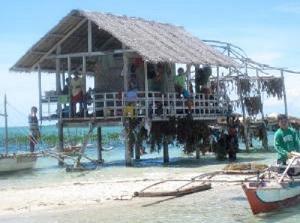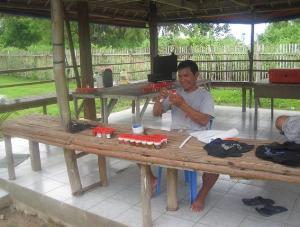James Hehre
The aim of this project is to investigate the role of seaweed farms on degraded shallow coral habitat. By using stable isotope analysis (SIA) to examine the feeding habits of a valuable herbivorous food fish, I will be able to test whether the introduction of seaweed farming subsidizes fish productivity.

My research focuses on the ecological role seaweed farming plays in shallow coral ecosystems on the Danajon Bank, which have been significantly degraded by human activities. The nature of these ecosystems creates potential for the introduction of seaweed farms to subsidize herbivorous fish, thereby increasing fisheries yields. I am using stable isotopes, a well-established technique in the study of animal diets, to determine the extent to which rabbitfish, an economically valuable food fish, feed on farmed seaweed. This will be an important contribution toward understanding ecosystem dynamics on degraded shallow coral habitat.

This project exists as part of an integrated study of the role seaweed farming plays in coral communities, which is particularly important in light of the rapid expansion of the seaweed farming industry and because the focal coral system is already highly degraded. Building on previous work on the socioeconomics of seaweed farming undertaken in this region, other projects have examined fish and coral communities in farming areas in order to create a broad and more integrated picture of seaweed farming
Globally, and nationally, policymakers will be able to use the results of this study to help formulate consistent and sustainable policies on seaweed farming. Seaweed farming and its effects are not limited to the Philippines. The industry is expanding to meet increasing demand, especially in places like China, India and Equatorial Africa. This study will have international implications on the creation of more sustainable and efficient production of seaweed while providing information on how to protect shallow coral ecosystems. Seaweed farming serves a growing market, and as industry expands to meet ever-increasing demand, the potential for greater impacts increases. However, if managed correctly, its introduction could have long-term positive consequences for the sustainable use of marine resources.